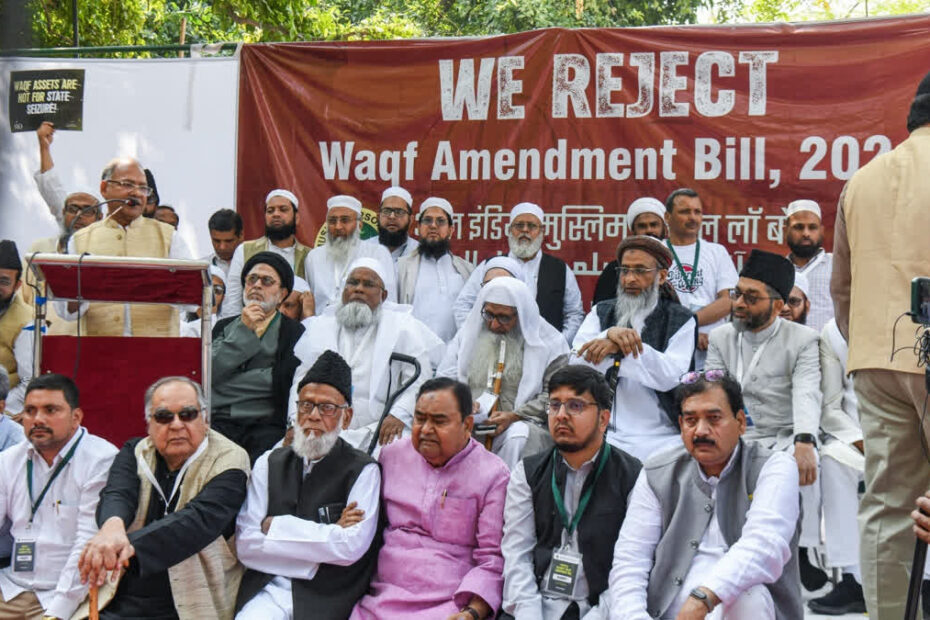5 April, 2025 | New Delhi : The Association for Protection of Civil Rights (APCR) filed a writ petition before the Hon’ble Supreme Court of India challenging the Unified Waqf Management, Empowerment, Efficiency and Development (UMEED) Act, 2024
The amendments empower the State to interfere in the functioning of Waqf Boards and unilaterally alter the status of Waqf properties, thereby eroding the legal and religious sanctity of centuries-old endowments. While the principal act emphasized Muslom-exclusive control and expertise, the new amendments dilute religious autonomy in the name of inclusivity by allowing the inclusion of Non-Muslims in key positions and decision making processes. It also adjusts member composition criteria for both the Central Waqf Council and State Waqf boards, reduces the finality of Tribunal decisions and revises penalty provisions. Furthermore, it entirely omits several clauses and sections such as the override clause in section 104, which previously allowed the act to override other laws. Lastly, the new amendment empowers the central government to make rules for multiple aspects, whereas earlier, this power rested with States.
The petition seeks to strike down the Amendment Bill in its entirety for violating Articles 14, 25, 26, 29, and 30 of the Constitution of India. The grounds for opposing this amendment are as follows:
- Firstly, the concept of Waqf, is firmly rooted in Islamic Law and tradition. It is a perpetual act of charity meant to serve the community. The renaming of the act serves no functional purpose, nor is there any necessity to do so. It is reminiscent of the British colonial practices of systematically erasing legal traditions of indigenous communities.
- The amendment violates article 14 of the constitution as it fails to meet the reasonable classification test as upheld by the court in West Bengal v. Anwar Ali Sarkar (1952). The amendment forces the inclusion of Non-Muslims in key positions and the decision-making process while these rules do not apply to non-Muslim charitable organisations who actively prohibit Muslim participation in their affairs.
- Article 25 guarantees the right to freely profess, practise and propagate religion, whereas, Article 26 grants religious denominations the fundamental right to establish and manage their own religious and charitable institutions. This amendment violates both these articles, as Waqf is an essential religious practice that ensures benefit to the society.
- The amendment undermines the established docrine of Waqf by user. Removing section 3(r) contradicts judicial precedents and sets a a dangerous precedent for exluding recognised religious rights. The exlusion of disputed properties from recognition as waqf will escalate frivolous litigation, leading to uncertainty and long legal battles. Mosques, Dargahs, graveyards and other religious institutions can be affected as exclusing govt. Properties allows the state to take over land previously recognised as Waqf by user. Additionally the management of these properties will also require new documentation, legal verification or govt. approval.
Through this petition, APCR seeks the declaration that the Unified Waqf Management, Empowerment, Efficiency and Development (UMEED) Act, 2024 violates Article 14,25, 26 of the constitution and is thereby, unconstitutional and violative of the part III of the Indian Constitution.
Case Title: Association for Protection of Civil Rights vs Union of India
& ors
Diary No: Writ Petition D.No. 18101 of 2025
Efiling no.: ECSCIN01137862025
Date: 05.04.25 Counsels for Petitioners: – Adv. Adeel Ahmad (AOR), Adv. Taqdees Fatima, Adv. Mohammad Mobashshir Aneeq, Adv. M. Huzaifa & Adv. Atul Yadav
